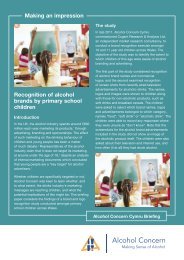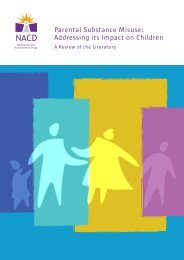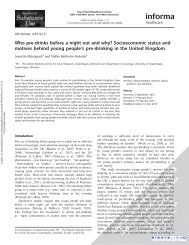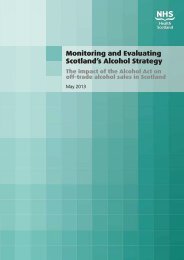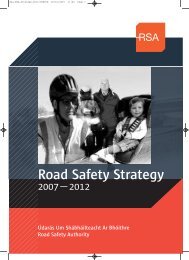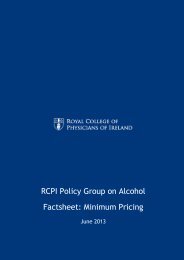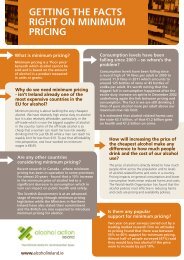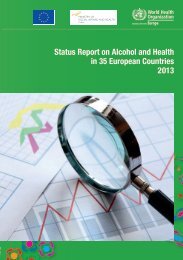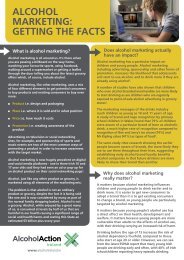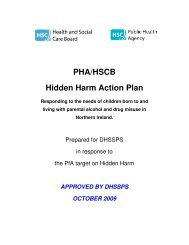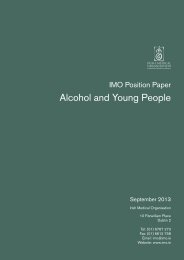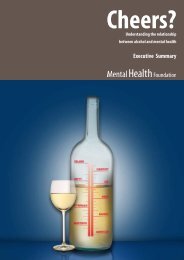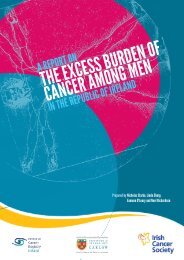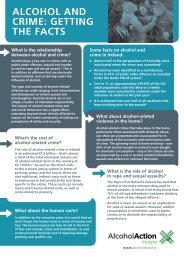Addressing the harmful use of alcohol - WHO Western Pacific Region
Addressing the harmful use of alcohol - WHO Western Pacific Region
Addressing the harmful use of alcohol - WHO Western Pacific Region
Create successful ePaper yourself
Turn your PDF publications into a flip-book with our unique Google optimized e-Paper software.
6. Setting a minimum purchase age<br />
The supply <strong>of</strong> <strong>alcohol</strong> to minors by adults, perhaps just above <strong>the</strong> minimum age <strong>the</strong>mselves,<br />
and without <strong>the</strong> knowledge <strong>of</strong> parents, is a serious public health issue, but laws are underenforced.<br />
To change this situation, legislation needs to be clear, simple and easily enforceable.<br />
A few well-publicised prosecutions raise awareness and may help prevent <strong>the</strong> serious harm<br />
that comes when some teenagers are supplied with large quantities <strong>of</strong> <strong>alcohol</strong> by adults.<br />
Age verification<br />
It is <strong>of</strong>ten a defence against a charge <strong>of</strong> selling to a minor or allowing a minor into agerestricted<br />
premises if <strong>the</strong> seller has seen an evidence <strong>of</strong> age document. These documents<br />
should be defined in <strong>the</strong> legislation and are typically a driver’s licence, passport, or o<strong>the</strong>r<br />
<strong>of</strong>ficially authorized identification card (and it should be an <strong>of</strong>fence for purchaser to present<br />
false documents). Checking identification is an important host responsibility practice.<br />
Expressing this practice in legislation as a defence mechanism may not be sufficient to enable<br />
monitoring agencies to require it to be done.<br />
Ontario makes it an <strong>of</strong>fence to serve people known or appearing to be under <strong>the</strong> age <strong>of</strong><br />
19, while Manitoba’s regulations require licensees and staff to request pro<strong>of</strong> <strong>of</strong> age from all<br />
young-looking persons. In New Zealand, where seeing pro<strong>of</strong> <strong>of</strong> age is a defence, supermarket<br />
chains <strong>the</strong>mselves adopted a policy <strong>of</strong> requesting identification from everyone who looks<br />
under 25 years – which has been acceptable to customers. In late 2009, Scotland introduced<br />
an amendment to its licensing Act to make it a condition <strong>of</strong> <strong>the</strong> licence to have an in-ho<strong>use</strong><br />
age verification policy. This is a management policy that steps are to be taken to establish <strong>the</strong><br />
age <strong>of</strong> a person attempting to buy <strong>alcohol</strong> if it appears to seller that <strong>the</strong>y may be less than 21<br />
years <strong>of</strong> age or such older age as may be specified in <strong>the</strong> policy.<br />
Monitoring and enforcement<br />
Legislation on licensing <strong>the</strong> sale <strong>of</strong> <strong>alcohol</strong> makes it an <strong>of</strong>fence for licence holders or <strong>the</strong>ir<br />
staff to sell <strong>alcohol</strong> to minors, and this may also result in loss <strong>of</strong> <strong>the</strong> licence. New Zealand<br />
and Scotland both require <strong>the</strong> district court to notify <strong>the</strong> licensing authority <strong>of</strong> any convictions.<br />
In some jurisdictions, police now undertake controlled purchase operations to test whe<strong>the</strong>r<br />
bars or retailers are selling to minors without checking <strong>the</strong>ir age. In this test, a minor attempts<br />
to purchase <strong>alcohol</strong> without identification but does not lie about <strong>the</strong>ir age if asked. The<br />
purchase is made using a cash or credit card, which fails (avoiding <strong>the</strong> problem <strong>of</strong> what to do<br />
with <strong>the</strong> <strong>alcohol</strong>). This may require <strong>the</strong> law to exempt minors who purchase <strong>alcohol</strong> to assist<br />
police. Police publicize <strong>the</strong> names <strong>of</strong> businesses caught selling to minors and may prosecute<br />
(Alcohol Advisory Council 2004; Huckle et al. 2008a; Montgomery et al. 2006).<br />
Return to TOC<br />
69



